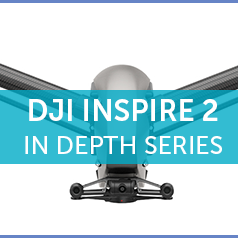
Products
Inspire 2 Batteries - Part 1 Of Our In Depth Series
In part one of our in-depth series on the DJI Inspire 2 quadcopter, Heliguy is focusing on the Intelligent Flight Battery, the component powering your drone. ... Read More
inspire2indepthbanner.png DJI’s recent release of the Inspire 2 has been heralded as a huge step forward by those in the professional filmmaking community. Simple to use and with ground-breaking image quality for an aerial camera unit, it’s likely to change the face of unmanned video creation. To celebrate the launch of the Inspire 2, Heliguy is undertaking a series of ‘In-Depth’ articles (similar to our previous Phantom 4 series) which will take you through each core component of the aircraft with all the details you will need to make an informed decision.
Series Guide
Part 1 - Inspire 2 Batteries In Depth Part 2 - Inspire 2 Remote Controller In Depth Part 3 - Inspire 2 Cameras & Licenses In Depth Part 4 - Inspire 2 The Aircraft In Depth
Part One focuses on the ‘Intelligent Flight Battery’ and how it powers the Inspire 2, keeping you airborne while you capture spectacular footage. batterydiagraminspire2.png
Facts & Features
This section focuses on the key points of the Inspire 2’s dual battery system and runs through the specifications so that you can see how everything works together. We’ll also explain what improvements have been made from the Inspire 1 range’s battery and charger system. The DJI TB50 Intelligent Flight Battery has a 4280mAH capacity and 22.8V voltage, guaranteeing impressive battery life, as well as containing a number of security features which prevent it from overcharging and overheating amongst other variables.
Specifications
See below for the full specifications of the DJI Inspire 2 battery and charger unit.
Battery
#### Model | DJI TB50 |
#### Capacity | 4280 mAh |
#### Voltage | 22.8 V |
#### Battery Type | LiPo 6S |
#### Energy | 97.58 Wh |
#### Net Weight | 515 g |
#### Charging Temperature | 41° to 104° F (5° to 40° C) |
#### Operating Temperature | -4° to 104° F (-20° to 40° C) |
#### Max Charging Power | 180 W |
#### Storage Temperature | Less than 3 months: -4° to 113° F (-20° to 45° C) More than 3 months: 72° to 82° F (22° to 28° C) |
Charger
#### Model | IN2C180 |
#### Voltage | 26.1 V |
#### Rated Power | 180 W |
Charging Hub
#### Model | INSPIRE 2 CHARGING HUB (IN2CH) |
#### Compatible Battery Charger | Inspire 2 Battery Charger (IN2C180) |
#### Compatible Battery Model | TB50-4280mAh-22.8V Intelligent Flight Battery |
#### Operating Temperature | 41°to 104° F ( 5° to 40°C) |
#### Input voltage | 26.1V |
#### Input current | 6.9 A |
#### Weight | 253 g |
#### Charging Time (Two batteries) | 90 minutes |
#### Charging Time: (Four batteries) | 180 minutes |
Buy your Inspire 2 Batteries here
Key Features
New sleek design to match the Inspire 2 quadcopter
Automatic discharging functionality
Over charge protection
Dual TB50 batteries ensure redundancy and safety
The Intelligent Flight Battery In Action
The design may be different to people familiar with the Inspire 1's batteries but using these new TB50 units is as simple as ever. Ensure that your firmware is up to date and, once they're sufficiently charged (check the LED display) insert them into your Inspire 2 aircraft, power them up and you're ready to take to the air and capture spectacular footage. Powering On: Tap the power button and then press and hold it for two seconds to switch on the battery. This will wake up the unit and if you have done this correctly the main LED will turn red and the others will display the current charge level. Powering Off: Tap the power button and then press and hold it for two seconds to switch off the battery. inspire2batteries.png
See our accessories section for more Inspire 2 add-ons
Notes
Simple sliding mechanism and start-up process
The LEDs display the current battery life
A self-heating system ensures great performance even in cold climates
Never insert or remove a battery from the aircraft when it's switched on
Charging the Battery
Now that you understand the workings of the Intelligent Flight Batteries, we’ll take you through the process of charging them correctly and safely using the DJI Inspire 2's Charging Hub. You will need the DJI Inspire 2 Battery Charging Hub (which is capable of charging four batteries at a time). It's recommended that you pair batteries based on charging cycles through the DJI GO 4 app to ensure maximum performance which translates into a battery life of up to 27 minutes when flying with the Zenmuse X4S. For two batteries you can expect a charge time of 90 minutes (double that if you're charging the full four), meaning you don't have to wait too long to get up and running with DJI's TB50s in the Inspire 2. inspire2charginghub1.png Notes
Avoid overcharging (despite the protective measures in place, monitor the charging process)
When charging 2 pairs of batteries, the pair with the most stored power will charge first
Only charge the TB50s with official DJI charging equipment
Summary
The new dual battery set-up ensures a longer flight time and increased safety while flying the Inspire 2. DJI's advanced in all facets of drone manufacturing and their willingness to listen to suggestions from professional customers is clearly evident throughout this aircraft, from its familiar yet streamlined design, to the all-important TB50 Intelligent Flight Batteries. We will have more insights into the performance of the DJI Inspire 2's batteries once our tech team have had the opportunity to run some comprehensive tests in-house and out at our flying field. Until then, if you require any more information regarding the Inspire 2’s battery, the craft itself or just want to chat to a member of our team don’t hesitate to get in touch.
Call
...
Keep checking back to Heliguy Insider for the rest of our ‘Inspire 2 In Depth’ series and the latest drone industry news.
